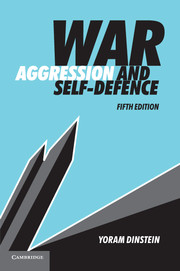Book contents
- Frontmatter
- Contents
- Introduction to the fifth edition
- From the introduction to the first edition
- Table of cases
- Table of treaties
- Table of Security Council resolutions
- Table of General Assembly resolutions
- Abbreviations
- Part I The legal nature of war
- Part II The illegality of war
- 3 A historical perspective of the legal status of war
- 4 The contemporary prohibition of the use of inter-State force
- 5 The crime of aggression
- 6 Controversial consequences of the change in the legal status of war
- Part III Exceptions to the prohibition of the use of inter-State force
- Index of persons
- Index of subjects
- References
6 - Controversial consequences of the change in the legal status of war
from Part II - The illegality of war
Published online by Cambridge University Press: 05 June 2012
- Frontmatter
- Contents
- Introduction to the fifth edition
- From the introduction to the first edition
- Table of cases
- Table of treaties
- Table of Security Council resolutions
- Table of General Assembly resolutions
- Abbreviations
- Part I The legal nature of war
- Part II The illegality of war
- 3 A historical perspective of the legal status of war
- 4 The contemporary prohibition of the use of inter-State force
- 5 The crime of aggression
- 6 Controversial consequences of the change in the legal status of war
- Part III Exceptions to the prohibition of the use of inter-State force
- Index of persons
- Index of subjects
- References
Summary
436. The profound change that has gripped the international legal system, as a result of the prohibition of the use of inter-State force (see supra 233) and the criminalization of acts of aggression (see supra 332 et seq.), raises searching questions in regard to a number of concepts and institutions rooted in the obsolete axiomatic postulate that States are free to commence hostilities at will (see supra 207–8). It is true that, in some measure, the international community has already adjusted itself to the new legal environment. This is manifest, for instance, in the current invalidity of peace treaties dictated by the aggressor to the victim of aggression (see supra 107 et seq.). But modification of time-honoured doctrines encounters intractable difficulties (both practical and theoretical) in many areas.
437. The need for adaptation of the law to the present status of inter-State force is particularly attractive when adumbrated against the silhouette of the antiquated perception of the two antagonists in war (aggressor and victim) as intrinsically equal in jus ad bellum standing. It is noteworthy that, as pointed out already by Grotius, the Latin word bellum is derived from the more ancient term duellum. For centuries, international law treated war in the same manner that domestic law used to deal with the duel. War, like a duel, was viewed with toleration. The parity of the contenders was taken for granted, and the sole concern was about adherence to criteria of ‘fair play’. Yet, just as the duel is no longer permitted by national legal systems, war is now forbidden by international law. The modern jus ad bellum treats one of the Belligerent Parties as a criminal while the other is either the victim of the crime or has come to the victim’s rescue. The question is whether, as a result, the ground has not been cut from under certain legal norms linked to the idea of the equality of Belligerent Parties.
- Type
- Chapter
- Information
- War, Aggression and Self-Defence , pp. 163 - 184Publisher: Cambridge University PressPrint publication year: 2011



